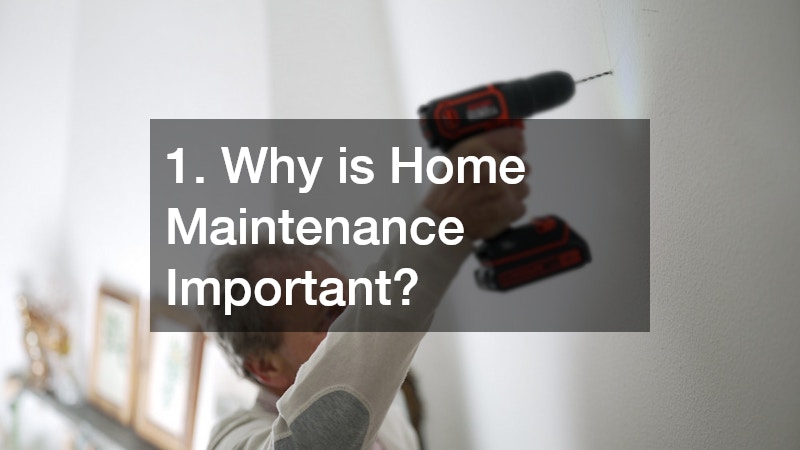Welcome to your comprehensive guide to mastering home maintenance and becoming a savvy homeowner with expert skills to care for your investment. In this guide, we’ll explore the most common questions and essential topics you’ll need to become proficient in maintaining your home. Whether you are dealing with the complexities of plumbing or exploring the basics of HVAC upkeep, this guide will empower you with the knowledge required to address any home maintenance task that comes your way. By equipping yourself with the right tools and understanding the fundamentals of home care, you’ll not only protect your investment but also enhance your home’s value and longevity. Regular maintenance prevents costly repairs in the future and helps avoid unexpected emergencies. Whether it’s learning how to clean your air filters, inspect your roof for leaks, or manage your home’s electrical system, these skills are key to keeping your home running smoothly.
As we navigate through topics such as energy efficiency, pest control, and more, you’ll emerge as a home maintenance expert ready to tackle any challenge. In addition to these practical skills, understanding the importance of seasonal maintenance is critical. Tasks like checking your furnace before winter or ensuring your gutters are cleaned in the fall can save you from larger issues down the road. Maintaining your home also involves knowing when to call in professionals for specialized services. While DIY can be rewarding, there are certain situations where expertise is necessary to avoid bigger problems or hazards. This guide will help you understand what tasks you can take on yourself and which require professional help. By the end of this guide, you’ll feel confident and well-equipped to maintain your home, ensuring it remains a safe, comfortable, and valuable place for years to come.
1. Why is Home Maintenance Important?

Regular home maintenance is crucial for preserving the structural integrity and overall condition of your home. Plumbing issues, for instance, can lead to costly repairs if not addressed promptly. By becoming home maintenance experts, homeowners can prevent complications that might arise unexpectedly, avoiding unnecessary stress and expenses in the future.
It is important to consistently maintain your home to ensure it remains energy efficient and safe. A minor issue, such as a leaky faucet, might seem insignificant, but over time it can result in significant water waste and increased utility bills. Thus, understanding and practicing proper maintenance habits is fundamental for every responsible homeowner. Additionally, addressing minor issues early can prevent them from escalating into major problems, saving you time and money.
Moreover, regular upkeep helps in retaining or even increasing your home’s resale value. By engaging with maintenance tasks—ranging from basic plumbing checks to employing a fence contractor for necessary adjustments—you demonstrate to potential buyers that your home has been well-cared for, which is a significant selling point. Regularly updating systems such as HVAC and ensuring that essential features like windows and doors are functioning properly also add to your home’s appeal and overall marketability.
2. What Basic Tools Should Every Homeowner Have?
Every homeowner should equip themselves with a set of essential tools to tackle everyday maintenance tasks. A reliable toolbox should include items like a hammer, screwdrivers, wrenches, and a tape measure. These tools form the foundation of your ability to act as a home maintenance expert.
In addition to the basics, having a few specialized tools can be highly advantageous. This includes a stud finder for wall projects or a saw for light woodworking. When enlisting a fence contractor, having these tools on hand can provide clarity and understanding during any adjustments or installation processes they perform.
Organizing your tools efficiently is also key to ensuring you’re prepared for home maintenance tasks. By doing so, you save time and reduce frustration when emergencies arise. As home maintenance experts suggest, labeling your tools and maintaining an inventory can enhance your readiness and response time.
3. How Can I Create a Home Maintenance Checklist?
Developing a home maintenance checklist is strategic in staying organized and ensuring nothing is overlooked. This list should include routine checks like monitoring the condition of your roof and verifying plumbing status. It becomes a living document that evolves as you gain further experience as a homeowner.
The selection of tasks for your checklist will differ slightly depending on your location and the age of your home. For example, in wetter climates, homeowners might need to include routine roofing contractor inspections to prevent moisture-related damage. Having a comprehensive checklist aids in scheduling regular maintenance tasks effectively.
Once your checklist is established, it’s essential to schedule regular reminders to complete each task. Integrating digital tools, such as calendar alerts, can ensure you remain on schedule. By adhering to this system, you position yourself as one of the proactive home maintenance experts ready for any home care challenges.
4. How Do I Approach Plumbing Maintenance?

Plumbing maintenance begins with routine inspections for leaks and signs of corrosion or damage. By identifying issues early, you exemplify the diligence expected of home maintenance experts. Simple actions like cleaning drains and checking for leaks can prevent extensive sewer repair down the line.
Homeowners should also familiarize themselves with their home’s water supply and shutoff system. This knowledge is crucial in the event of an emergency, such as a burst pipe. Knowing how to turn off water promptly can prevent substantial damage and costly repairs.
In scenarios where complex plumbing problems arise, contacting a professional is sometimes necessary, yet having a foundational understanding empowers homeowners to engage knowledgeably with professionals, such as during door repairs or when a home addition contractor is needed for larger projects.
5. What Are the Best Practices for HVAC Maintenance?
Proper HVAC maintenance ensures your home remains comfortable throughout the year and operates efficiently. Regularly replacing air filters is a fundamental task recommended by home maintenance experts to avoid overworking the system. Clean filters ensure proper airflow and maintain indoor air quality.
Scheduling annual professional inspections is also recommended to evaluate furnace repair needs or address other potential system inefficiencies. Specialists can identify issues that the untrained eye might overlook, ensuring your HVAC system functions optimally year-round.
For those homeowners inclined to do more themselves, cleaning the vents and vacuuming around HVAC units are great practices to adopt. As with other maintenance, using an organized approach helps in knowing when to call in a remodeler for advice on upgrades or replacements.
6. How Can I Maintain My Home’s Electrical System?
Maintaining your home’s electrical system involves regular checks for any signs of wear, such as frayed wires or malfunctioning outlets. Staying informed about basic troubleshooting and safety protocols is a hallmark of an informed homeowner and a distinguished home maintenance expert.
It’s also advisable to test and replace smoke detectors and carbon monoxide alarms regularly. Ensuring these safety devices are functioning can be a lifesaver, providing essential alerts in emergencies.
While DIY electrical work is generally discouraged due to safety risks, understanding your home’s electrical layout is beneficial. When it comes to more complex tasks, hiring a certified electrician or home addition contractor ensures that work is completed safely and to code.
7. What Should I Know About Roof Maintenance?

Your roof is a major asset and requires regular attention to maintain its condition. Home maintenance experts stress the importance of routine inspections, particularly after severe weather. These checks help identify missing shingles or other damage early on.
Engaging with a roofing contractor annually or semi-annually is beneficial for assessing any major repairs or replacements needed. They provide a professional overview, ensuring any damage is handled before it escalates into more severe problems.
Moreover, adding tasks such as clearing debris from gutters or performing chimney sweeping are essential in ensuring water properly drains away from your home. Clear pathways prevent moisture accumulation, which can lead to ice dams and leaks, preserving the integrity of your roofing structure.
8. How Do I Care for My Home’s Exterior?
Maintaining your home’s exterior is crucial to its curb appeal and structural longevity. Regular painting and siding repairs prevent decay and ensure that your home remains visually appealing. Home maintenance experts emphasize the importance of addressing minor imperfections before they develop into larger issues.
Routine checks on the driveway and exterior pathways help maintain safety and aesthetics. Cracks or uneven surfaces should be repaired to prevent accidents and maintain your home’s exterior appearance. Hiring an AC repair service can also assist in optimizing exterior units that contribute to curb appeal.
The exterior also encompasses the landscaping surrounding your home. Regular lawn care and trimming can prevent overgrowth that might impact structures or lead to unnecessary pest problems. Incorporating these practices solidifies your home as a safe and welcoming environment.
9. What Are Some Tips for Effective Pest Control?
Effective pest control begins with maintaining cleanliness within and surrounding your home. Ensuring food waste is properly disposed of and sealing any entry points minimizes the chance of infestations. Home maintenance experts advocate for routine checks and preventative actions.
If you encounter persistent pest issues, especially in older homes, consulting with a professional can be beneficial. These experts can identify underlying factors contributing to infestations and suggest targeted solutions, sometimes involving sewer repair to eliminate nesting sites.
Conducting regular inspections alongside a professional pest control service as needed can provide peace of mind. Maintaining a proactive stance on pest control allows your home to remain a comfortable, healthful environment free from unwanted invaders.
10. How Can I Improve My Home’s Energy Efficiency?

Enhancing your home’s energy efficiency involves multiple strategies, beginning with assessing and upgrading insulation. Quality insulation conserves heat during winter and keeps cool air inside during summer. By improving insulation, homeowners can achieve significant savings on utility bills over time.
Replacing old windows with energy-efficient models or installing programmable thermostats can further optimize your home’s energy use. These upgrades, recommended by home maintenance experts, help regulate temperature and contribute to a more sustainable living environment.
Additionally, regular servicing of your HVAC and exploring options like solar panels with a remodeler’s advice can further enhance energy efficiency. By continually looking for ways to reduce energy consumption, homeowners make environmentally conscious choices while lowering expenses.
Becoming Home Maintenance Experts
By following this guide, new homeowners can confidently tackle home maintenance tasks and become true home maintenance experts. Familiarity with essential tools and techniques positions you to proactively manage, address, and anticipate the needs of your home. An informed approach to home maintenance ensures that your house remains a valuable investment over time. From small repairs to larger projects, having a solid understanding of basic maintenance tasks will allow you to handle issues efficiently, saving both time and money in the long run.
The skills acquired through understanding and implementing these practices protect not only the physical aspects of your home but also enhance the quality of life within. Routine maintenance, such as checking for leaks, cleaning out drains, and inspecting appliances, helps ensure that your home operates smoothly, minimizing the risk of major breakdowns. As you expand your knowledge and experience, you contribute to your home’s safety and comfort, creating an inviting atmosphere for your family and guests.
This sense of control and confidence allows you to address challenges as they arise without feeling overwhelmed. Additionally, homeownership provides opportunities for customization and improvement, and with your growing skill set, you can embark on projects that enhance the aesthetic and functionality of your space. Whether it’s updating your kitchen, installing energy-efficient solutions, or improving curb appeal, these projects add long-term value to your home.
Remember, ongoing effort and learning are vital to preserving your home’s value and ensuring it remains a safe and comfortable sanctuary for years to come. Embrace the challenges and rewards of homeownership, knowing you are equipped to handle each with the knowledge and skills of a home maintenance expert. As you continue to learn and adapt, you will not only preserve the quality of your home but also contribute to creating a space that reflects your style and provides lasting comfort for your loved ones.

